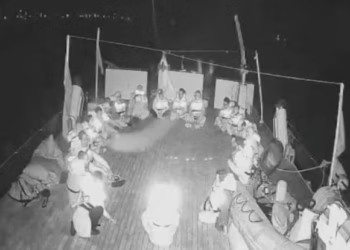The 46ᵉ edition of the Cairo International Film Festival (CIFF), which will take place from November 12 to 21, 2025, will end with a moment of a major symbolic and artistic scope for Arab and international cinema. The film Hind Rajab’s voicelast achievement of the Tunisian filmmaker Kaouther Ben Hania, was chosen to close the festival. His projection, which will mark his first in Africa, will offer the Egyptian public the opportunity to discover a work already widely praised on the international scene and which, through its story, carries a universal cause: to make the voice of the Palestinians confronted with colonization and massacre heard.
This selection at the CIFF is part of an exceptional journey. During the 82ᵉ Mostra of Venice, Hind Rajab’s voice won the prestigious silver lion – Jury Grand Prixone of the most coveted distinctions in world cinema, as well as six of the eight prices awarded in the parallel sections. Acclaimed by criticism and welcomed by a record ovation of almost twenty-four minutes, The film has established itself as one of the major works of the year. Beyond Venice, The film was chosen by Tunisia to represent it at the Oscar 2026 for the best international filmstrengthening his global recognition and highlighting the role of Kaouther Ben Hania as an ambassador of contemporary Arab cinema.
Tuniso-Française co-production, Hind Rajab’s voice skillfully mix fiction and documentary, inspired by upset real events. He tells the story of Hind Rajab, a six -year -old Palestinian girl, trapped in a car under an intense bombardment in Gaza after losing his family. In these terrifying moments, Hind manages to join the emergency services of the Palestinian Red Red Red, while the emergency teams are fighting to reach its position. The film uses the authentic audio recording of this call, offering a striking cinematographic experience where silence, fear and expectation become tangible. The child’s voice, fragile and determined, is transformed into a universal symbol of innocence confronted with violence and allows the public to grasp, by emotion, the reality of millions of Palestinians whose life is upset by conflict.
Kaouther Ben Hania has been essential for more than a decade as an essential figure in contemporary Tunisian and Arabic cinema. His films, deeply committed, explore great human and social questions with sensitivity, often mixing fiction and documentary to create a cinema that challenges and moves. She was notably recognized for La Belle and La Meute (2017), presented in Cannes, who denounced the violence against women in Tunisia, and The man who sold his skin (2020), selected in Venice And appointed to the Oscars. His documentary The girls of Olffa, in official competition in Cannes And Appointed to the Oscar for best documentaryillustrates its constant interest in the accounts of individual life faced with collective issues. In each of his films, Kaouther Ben Hania highlights often suffocated voices, transforming personal experience into a universal story and offering the spectator a deep intellectual and emotional commitment.
Hussein Fahmy, president of the festival, said: “ To present Hind Rajab’s voice As a closing film of this edition reflects the deep conviction of the festival in the role of cinema as a defender of human causes, and especially of the Palestinian cause. It is an overwhelming work that demonstrates how art can become a voice for justice and freedom.»»
Mohamed Tarek, artistic director, added: “The selection of the film by Kaouther Ben Hania for the final of the festival celebrates the role of Arab cinema in the transmission of the voice of Palestine to the world and reaffirms that cinema can be a bridge uniting peoples and preserving our common memory. The silver lion won in Venice further strengthens its international scope and the choice of Tunisia to offer it to the 2026 Oscars confirms its importance and the excellence of Tunisian cinema . »»
The projection ofHind Rajab’s voiceAt the end of the CIFF 2025 reminds all of the power of art to face pain and testify to injustices. Through the voice of Hind and all children whose childhood has been stolen by violence, the film demonstrates that cinema can transform a tragic story into light, offer a voice to those who have no and maintain living hope, while encouraging a collective reflection on solidarity and humanity.
Neïla Driss





